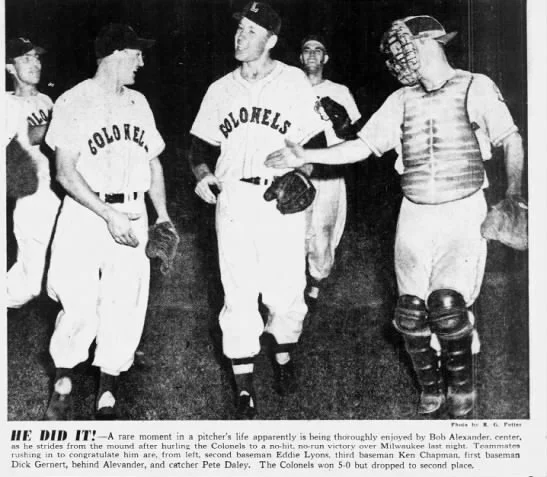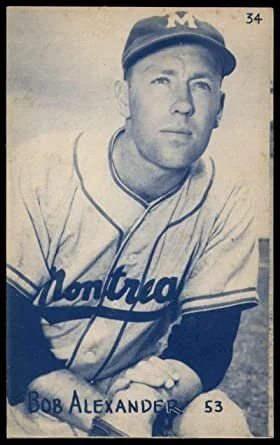Alexander blazed a trail in MLB and Japan
Vancouver native Bob Alexander pitched in four games for the Baltimore Orioles in 1955. Photo: The Evening Sun (Baltimore)
August 7, 2021
By Kevin Glew
Cooperstowners in Canada
Bob Alexander was the very definition of a journeyman professional pitcher, toeing the rubber for no less than 17 teams in 18 seasons.
But the crafty right-hander’s resume does boast two memorable firsts.
On April 11, 1955, when he hurled 1 2/3 innings in relief for the Baltimore Orioles against the Washington Senators at Griffith Stadium, he became the first player born in Vancouver to pitch in the majors.
Just over four years later, he became the first Canadian to pitch professionally in Japan when he posted a 4.64 ERA in 13 appearances for the Toei Flyers of the Japan Pacific League.
So even though his big league career consisted of just 10 appearances, Alexander can still, in some ways, be regarded as a trailblazer.
Now before I write too much, I should point out that portraying Alexander as a flag-waving Canadian would be misleading. He moved to the United States with his parents when he was just nine months old.
“I decided to go with the family since I didn’t have my driver’s license,” Alexander said jokingly to Jim Shearon for his 1994 book, Canada’s Baseball Legends.
But the 6-foot-2, 205-pound hurler was born north of the border and alphabetically, his name consistently appears near the top of lists of Canadian major leaguers. So it seems fitting to shine the spotlight on him in the year of the 66th anniversary of his major league debut.
A young Bob Alexander with his mentor and former big leaguer Wilbur Cooper. Photo: Pittsburgh Post-Gazette
Alexander was born in 1922 and, according to a Pittsburgh Post-Gazette article published on May 16, 1942, he was raised in Buffalo, N.Y. In 1941, while attending Bethany College in West Virginia, he pitched for the school team and enrolled in Wilbur Cooper’s baseball school that fall. A former Pittsburgh Pirates pitching star, Cooper won 216 big league games between 1912 and 1926. Alexander honed his skills under the ex-major leaguer and was signed by the New York Yankees in 1942.
“He possesses a fine fastball and a good curve, and in addition has good control,” reads a brief scouting report in the Pittsburgh Post-Gazette after Alexander had signed with the Bronx Bombers.
Alexander began pitching in the Yankees’ organization in class-D Butler in 1942 and was shuttled between the bullpen and starting rotation over the next three seasons, making it as high as class-B before he entered the U.S. Navy on September 6, 1944.
According to Gary Bedingfield’s Baseball in Wartime website, Alexander was an aviation cadet who played centre on the St. Mary’s Pre-Flight School basketball team in Northern California in the winter of 1944 and early 1945.
By the following summer, Alexander had been transferred to the Ottumwa Naval Air Station in Iowa, where he starred for their baseball team. Stints at air stations in Oklahoma, Texas and Tennessee would follow, prior to his discharge on May 3, 1946 at Lido Beach, N.Y.
Out of the Navy, he resumed his baseball career in the Yankees’ organization and was a durable starter for Class-A Denver in 1947, posting a 10-12 record and a 4.15 ERA in 219 innings. He topped that the ensuing campaign with the Double-A Beaumont Exporters, of the Texas League, when he registered 11 wins and a 3.70 ERA, while hurling a career-high 231 innings.
Alexander employed a crossfire (almost sidearm) delivery and relied primarily on a moving fastball and curveball to get hitters out. Over the years, he worked on a changeup, but he was never able to perfect it.
Despite his strong 1948 season, Alexander was dealt to the Boston Red Sox where he was assigned to the Double-A Louisville Colonels.
On July 29, 1950, he would toss a no-hitter for the Colonels over the Milwaukee Brewers (See photo below). In the contest, he walked just two batters and retired the last 18 hitters in order in the club’s 5-0 victory.
“It was my fastball,” Alexander told The Courier-Journal (a local Louisville paper) after the game. “It was sinking (today).”
But that still wasn’t enough to garner the now 28-year-old a big league call-up from the Red Sox, and in 1951, he landed in the Brooklyn Dodgers’ organization where he toiled with the Triple-A Montreal Royals for three seasons. The well-travelled righty notched 15 wins in 1951 – a total that topped the team and represented a personal-best – and helped the Royals win the Governors’ Cup.
Alexander collected eight more wins in 1952 to help the Royals to another pennant and returned to Montreal in 1953 to post a 5-4 record and was part of the last Royals team to win a Junior World Series.
Bob Alexander spent three seasons with the Montreal Royals.
After having bone chips removed from his elbow in the off-season, Alexander was sold to the Portland Beavers of the Pacific Coast League in 1954, where he won 10 games and tossed his second no-hitter. On August 17, he held the Oakland Oaks without a hit, while striking out 10, in a seven-inning contest to secure a 3-0 win for the Beavers.
“I didn’t have real good stuff, just lucky,” Alexander told Shearon, when reflecting on his second no-hitter in an early 1990s interview. “There were four or five good defensive plays in the outfield and one at shortstop.”
Alexander’s performance in Portland convinced the Baltimore Orioles to trade for him and invite him to spring training. And after a solid showing that March and 13 arduous seasons in the minors, the 32-year-old right-hander finally made his major league debut with the Orioles on April 11, 1955. And though his performance was shaky – he allowed four runs over 1-2/3 innings to the Senators – he could finally call himself a big leaguer.
Unfortunately, he was not a big leaguer for long. He appeared in just three more games with the O’s over the next month before being sent down to Portland.
A disagreement with O’s manager Paul Richards likely expedited his demotion. Alexander told Shearon that Richards had stopped talking to him after he declined to throw what the O’s manager deemed a “slip pitch” (similar to a palm ball). The Canuck pitcher said that the pitch hurt his arm.
“It may be that I haven’t given him quite enough opportunity,” Richards told The Baltimore Sun about Alexander for their May 9, 1955 edition, shortly before sending Alexander down to Portland. “But he seems to be the kind of pitcher who can’t quite get by in the majors throwing just a fastball and curve. I wasn’t able to give him another pitch to go with them this spring.”
Nearly four decades later, when Alexander spoke to Shearon, the ex-hurler was still unhappy with the way he was treated by the O’s.
“I really got the shaft (in Baltimore),” Alexander told Shearon. “Promises were made, but not kept. I never got to start a game, even though that is all I had ever done.”
Back in the minors in 1956 and 1957, the persistent hurler added a knuckleball to his arsenal, and won 12 and 14 games respectively for Portland, before his contract was purchased by the Cleveland Indians in early September 1957.
Pitching on a staff with Hall of Famers Early Wynn and Bob Lemon, Alexander made five appearances that month and permitted seven runs in seven innings.
The itinerant hurler returned to the Pacific Coast League and pitched for the San Diego Padres in 1958 and 1959. He would also toe the rubber for Triple-A Dallas in 1959, before finishing the year with the Toei Flyers of the Japan Pacific League, which, as noted earlier, made him the first Canadian ever to toe the rubber in the Japanese pro ranks.
He posted a 4.64 ERA in 13 appearances, including seven starts, in Japan, but he damaged his chances for a longer tenure with the club when he got into a confrontation with his manager, Yoshiyuki Iwamoto.
Alexander told The Capital Journal (a Salem, Ore. newspaper) in November 1959 that in one start the Flyers were leading 5-3 after four innings when Iwamoto wanted to pull him to give one of his star Japanese pitchers the chance to pick up the win.
“I was mad and had quite an argument with the manager,” Alexander recalled. “Of course, this was not good. I argued in front of the other players, the manager lost face which is very bad in Japan and I was asked to take a two-week vacation.”
Alexander returned to the U.S. for his final season in 1960 and served as a player-manager with Class-B Salem before retiring from baseball.
After hanging up his spikes, the wayworn B.C. native settled near Oceanside, Calif., and sold real estate.
“I probably stayed in the game too long,” Alexander told Shearon in the early 1990s, “but it took me to Japan, Cuba, Venezuela, Puerto Rico and the Dominican Republic and left me with a lot of good memories.”
Alexander passed away on August 7, 1993.






